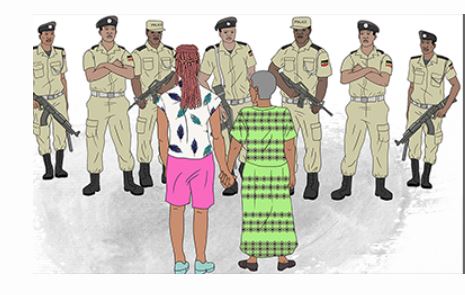
As the world celebrates Mother’s
Day—a time to honor the love, strength, and sacrifice of mothers—an
extraordinary group of Ugandan women is rewriting the script of maternal
courage by standing up for their LGBT children in a country where doing so is
both dangerous and defiant.
On May 8, just days before Mother's
Day, seven mothers of lesbian, gay, bisexual, and transgender (LGBT) Ugandans
gathered in Kampala to publicly affirm their love for their children and call
for dignity, protection, and equal rights.
Their meeting, held under the shadow
of Uganda’s harsh Anti-Homosexuality Act, challenges the narrative that LGBT
rights are “un-African” and asserts that a mother’s love knows no bounds—even
in the face of repression.
“We are not promoters of any agenda;
we are Ugandan mothers who have had to overcome many of our own biases to fully
understand, accept, and love our children,” the mothers wrote in an open letter
to President Yoweri Museveni in 2023, pleading with him not to sign the law
that has since made life almost unbearable for LGBT people in Uganda.
Their story, now told in a powerful
short film by Human Rights Watch and Chapter Four Uganda, marks a rare and
radical moment of visibility.
These women, many of whom have
suffered social ostracisation, verbal abuse, and even domestic violence, are
refusing to stay silent, offering a fierce and maternal counterpoint to
state-sanctioned discrimination.
“The Anti-Homosexuality Act does not
just endanger LGBT individuals; it places serious strain on their families,
particularly mothers, who are often the primary caregivers,” said Larissa
Kojoué, a researcher at Human Rights Watch.
“This law criminalises love—not just
the love between consenting adults, but also the love of a mother for her
child.”
Signed into law in May 2023 and
upheld by Uganda’s High Court in April 2024, the Anti-Homosexuality Act
includes provisions for the death penalty for “aggravated homosexuality” and up
to 20 years in prison for “promoting homosexuality”.
The Ugandan law has unleashed a wave of fear and
discrimination, with LGBT individuals facing violent attacks, evictions, and
even arbitrary arrests.
Despite the risks, these
mothers—members of PFLAG-Uganda, a support initiative under Chapter Four—have
emerged as vocal advocates for inclusion.
“We did not choose our children’s identities,
but we can choose how we respond,” one mother says in the documentary.
Their message: acceptance is not
betrayal of culture, but a return to its truest values—compassion, community,
and unconditional love.
“These mothers are showing what
courage and care look like under repression,” said Clare Byarugaba, founder of
PFLAG-Uganda.
“They’re not only standing by their
children, but also calling on society to reflect on the broader harm such laws
inflict on families.”
Their activism is a reminder that
mothers, often perceived as nurturers in private spaces, can also be powerful
agents of change in public life.
On this Mother’s Day, their voices
offer a new kind of tribute—one that resonates far beyond Uganda’s borders.
At its core, their fight is not just
about LGBT rights. It’s about love in its most enduring form. And on this
Mother’s Day, they are asking Africa—and the world—to listen.
“Loving our children is not a
crime,” one mother said.
“We are their first home, and we will never
shut our doors.”












